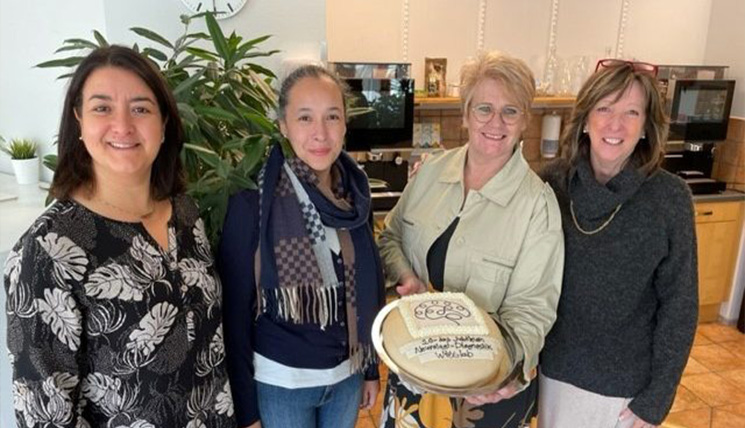A decade ago, an excellent collaboration began for the benefit of neurological diagnostics: Wieslab AB is celebrating its 10th anniversary in neurology ‒ together with EUROIMMUN. We wanted to know what is behind this successful concept and asked Lina Tebbla, Global Technology Manager from Wieslab: Dear Lina, can you provide an overview of your diagnostic portfolio and how neurology testing contributes to the diagnostic capabilities of Wieslab’s laboratory?
Our portfolio spans three distinct focus areas: neurologic diagnostics, autoimmune diagnostics, and monitoring of biopharmaceuticals. Within the neurology offering, dedicated panels are composed for specific diagnoses. Selected parameters within the panels also offer the possibility to distinguish from common overlapping or similar diseases. For individual requirements all tests of the panels are separately available, too. Additionally, certain tests can be expedited, with results available within 24 to 48 hours from sample arrival, contrasting with the usual one-week turnaround for routine samples. Sometimes, we receive notifications via email or phone calls about a sample dispatched via courier. In response, we strategically plan and prepare for its imminent arrival, expediting the handling process. Samples reaching us before 10 in the morning result in reports delivered after lunch. Under certain circumstances, this rapid turnaround can help the physicians to save patients´ lives, and we take pride in providing this assistance.

Lina Tebbla’s journey at Wieslab AB began eight years ago as a technician, specialising in autoimmune encephalitis and paraneoplastic syndromes using indirect immunefluorescent tests (IIFT) and immunblot methodologies. Her passion for diagnostics motivated her to continuously develop within the company. Today, as Global Technology Manager, she guides responsible colleagues and shares her expertise. For Lina, collaboration with physicians is crucial and, while demanding, the rewards of successful diagnoses are substantial. In the laboratory, it is easy to become intimately involved in the diagnostic process. The joint search for answers remains the motivation of every working day for her and the Wieslab team.
What specific neurological disorders or conditions can these tests help diagnose or monitor and what makes them of special value?
We use the broad portfolio of EUROIMMUN test systems for the identification of antibodies in suspected neurologic autoimmune diseases. Furthermore, we also test for biomarkers in the context of neurodegenerative diseases. For urgent testing we provide the following panels (e.g.): Autoimmune Encephalitis, Paraneoplastic Syndrome, Neuromyelitis Optica Spectrum Disorder (NMOSD)/MOGAD and HMGCR Antibodies. Beyond, our offer spans further panels. For instance: Autoimmune Epilepsy, Ophelia’s Syndrome, Pediatric Autoimmune Encephalitis, Alzheimer’s Disease Biomarkers, Amyotrophic Lateral Sclerosis (ALS), CNS Tissue Damage Biomarkers, Autoimmune Nodopathy/CIPD – Extended Analysis (IgG4), Guillain-Barré Syndrome, Small Fiber Neuropathy (SFN), Multiple Sclerosis, Myasthenia Gravis, and many others. As a specialized lab, we prioritise the next tier of tests, focusing on the rare rather than the routine neurologic tests commonly found in hospital labs. For us, the rare is routine.
Automation is increasing significantly in order to relieve the work load on valuable specialist staff. How do these innovations assist in your laboratory routine?
Given our focus on rare diseases, automated systems for the assays we employ are infrequently available. Nevertheless, we leverage SIMOA technology (Quanterix) and select semi-automated systems for the EUROIMMUN immunofluorescence systems. Our processes include running the EUROLINE blots and utilising kits from various manufacturers, both on automated platforms and through manual procedures. We are dedicated to exploring new solutions, investing considerable time and effort in knowledge sharing, and staying abreast of advancements especially in the dynamic field of neuroimmunology.
What daily challenges do you face in the laboratory?
A significant hurdle we face is the insufficient sample material for cerebrospinal fluid (CSF) testing, particularly for the line blot, which requires a larger sample amount compared to ELISA and IIF. Although cell-based assays (CBA) are very valuable tools in the identification of neural autoantibodies in neurological autoimmune diseases, reading the fluorescence patterns can be a major challenge. While the complementing line blot assay provides assistance, it’s not always sufficient. Recognizing the potential existence of clinically relevant antibodies not yet documented, our collaboration with EUROIMMUN has proven invaluable. In these instances, we additionally extend our collaboration to networks of researchers in the field, fostering the exchange of experiences and mutual support in tackling the more complex cases.
What makes your job at Wieslab and your collaboration with EUROIMMUN so unique?
Throughout my tenure at Wieslab, our collaboration with Sylvia – our trusted direct contact to EUROIMMUN – has been exceptional. She consistently provides excellent support for all the systems and kits we use. Our shared commitment to helping patients has strengthened our professional bond. In a small lab setting, proximity to physicians and patients is inevitable, and we’ve followed some patients for several years, fostering a deep investment in delivering the best care possible. Sylvia understands this commitment and equips us with the necessary tools, ensuring a steady supply of kits and connecting us with the right resources at EUROIMMUN when needed. Together within the EUROIMMUN research project UFO (unknown fluorescent object) to identify unknown neuroimmunological biomarkers and the reference lab, we’ve successfully resolved some intriguing cases.
How do you think the diagnosis of neurological diseases will look in another 10 years?
We stand at the forefront, carrying the legacy of those who preceded us. Predicting the future is challenging, but I anticipate that automation will play a significant role in our work. Nonetheless, the awareness of these diseases is likely to expand, and the demand for additional hands-on expertise will persist. As an increasing number of antibodies and detection platforms emerge, our ability to comprehend and leverage these new technologies as diagnostic tools will become even more crucial.
About EUROIMMUN’s contribution to neurological diagnostics EUROIMMUN has decades of experience in assisting the diagnosis of neurological diseases and is the leading provider of the corresponding diagnostics with a large number of unique patents. With its portfolio of test systems for the detection of neural autoantibodies, intrathecal antibodies against various pathogens as well as for the detection of beta-amyloids, tau proteins and neurofilaments, EUROIMMUN offers an incomparably comprehensive spectrum of analytical parameters for the diagnosis of neurological diseases in the fields of autoimmunology, infectious diseases and neurodegeneration.
